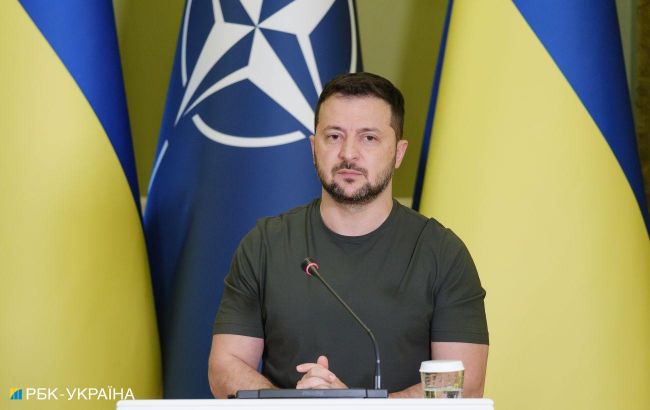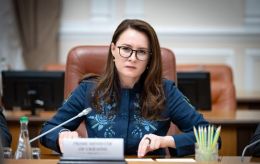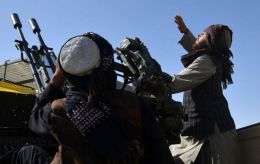Situation on front is not at deadlock: Zelenskyy responds to Gen. Zaluzhnyi's article
 President of Ukraine Volodymyr Zelenskyy (Photo: Vitalii Nosach, RBC-Ukraine)
President of Ukraine Volodymyr Zelenskyy (Photo: Vitalii Nosach, RBC-Ukraine)
There are currently many opinions regarding the situation on the front, but it is not a deadlock. Ukraine should not give up, according to President Volodymyr Zelenskyy at a briefing with the President of the European Commission, Ursula von der Leyen.
President Volodymyr Zelenskyy says that at the beginning of the full-scale invasion by Russian terrorists, Ukraine heard signals that it supposedly needed to give up territory, recognize Russia, and abandon Europe and NATO. However, Ukrainians continued to fight and achieved victory.
"Today, time has passed. People are tired. Everyone is getting tired, and there are different opinions... Everyone, regardless of their status. It's all understandable. But it is not a deadlock situation. I emphasize this once again. We have talked about it. It's not some kind of news," the president explained.
Russia controls the skies
According to the country's leader, Ukraine protects its military and does not plan to send them on offensive missions as Russia does with its soldiers. The delivery of F-16 fighter jets will resolve the issue of terrorists currently controlling the sky.
The president reminds that the decision regarding the F-16 planes has already been made, and now they are waiting for the completion of the training for Ukrainian pilots.
"It's a lengthy process. Quick decisions are not some kind of miraculous, technological ones... We tried. When there is anti-aircraft defense on the front, everyone clearly understands that the military is advancing, running, using equipment. There are various counter-offensive actions. We were in a complex, very complex situation a year ago, just like now. A deadlock situation, everyone said it was a deadlock situation. That's it. Everyone has forgotten. Several confident tactics, maneuvers, military operations, and you remember the Kharkiv region was liberated, a part of it. And you remember what happened in Kherson," added Volodymyr Zelenskyy.
We do not have the right to give up
As the president emphasizes, there are various opinions about the situation now, but "we do not have the right even to think about giving up." There is no alternative other than continuing the fight.
"But what is the alternative? Do we need to give up a third of our state? It will only be the beginning. He (Vladimir Putin, Russian dictator) will not stop at that. We already know what a frozen conflict is. We have drawn our own conclusions. Why are we returning to this or that idea or format? We need everyone to gather and address the issue, work more with partners on anti-aircraft defense, block the skies, provide our guys with the opportunity to carry out the necessary offensive actions. That's what we should be thinking about. Only about that," Zelenskyy emphasized.
The article by the Commander-in-Chief of the Armed Forces of Ukraine Valerii Zaluzhnyi
Recently, an article by the Commander-in-Chief of the General Staff of the Armed Forces of Ukraine, Valerii Zaluzhnyi, appeared in The Economist. According to him, the situation on the front has reached an impasse, and neither side can currently make progress because they are technologically evenly matched. He noted that the war was transitioning to a new phase, a "positional" phase characterized by grueling battles.
As reported by Politico, Valerii Zaluzhnyi's article stirred "partisan passions" in the U.S. Congress, and the White House emphasized the importance of continuing support for Ukraine.
How did the Office of the President react
Deputy Head of the Office of the President Ihor Zhovkva, when commenting on the article by Zaluzhnyi, stated that if he were in the military's shoes "the last thing I would do is to comment to the press and the public on what is happening at the front, what may happen at the front, and possible options."
"If I were in the military, probably the last thing I would do is to comment to the press and the public on what is happening at the front, what may happen at the front, and possible options. Because then we make the aggressor's job easier. I am sure that everything has been read very carefully and noted, and conclusions have been drawn. If we can achieve success this way, then perhaps this is a very deep strategic plan. But it seems very strange to me," Zhovkva said.

